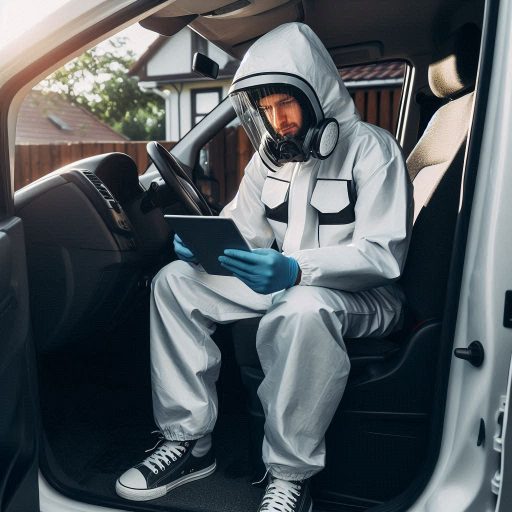Introduction
Let’s explore the licensing requirements for pest control workers.
Pest control plays a critical role in safeguarding health and property by eliminating harmful pests.
Pests can damage buildings, contaminate food, and spread diseases, making professional pest control essential for homes and businesses.
Common Types of Pests
- Rodents: Mice and rats chew wires and spread diseases.
- Insects: Cockroaches, ants, and bedbugs cause allergies and damage property.
- Termites: Destroy wooden structures and compromise building integrity.
- Mosquitoes and Flies: Transmit diseases like malaria and foodborne infections.
Licensed pest control workers are trained to identify pest types and use effective treatment methods.
Hiring licensed professionals ensures safe handling of chemicals and tools, minimizing risks to people and the environment.
Why Licensing Matters
- Safety: Licensed workers follow regulations on pesticide use, ensuring safe application.
- Compliance: They adhere to local and state laws for pest management.
- Effectiveness: Licensed professionals offer reliable, long-lasting pest solutions.
Hiring certified pest control workers guarantees professional service, protecting your family, employees, and property from pest-related risks.
This blog will guide you through licensing requirements to help you make informed decisions.
Overview of Licensing Requirements for Pest Control Workers
Why Licensing Is Necessary
Licensing is crucial for pest control workers to ensure public safety.
It serves as a safeguard against unqualified individuals applying pesticides.
Pest control involves using chemicals that can harm people, pets, and the environment.
Licensing ensures that workers are knowledgeable about safe handling and application practices.
This oversight helps protect both clients and the community from potential hazards.
Types of Licensing Requirements Depending on the State
In the United States, licensing requirements vary by state.
Each state has its regulations regarding pest control practices.
Some states require workers to obtain a general pest control license, while others have specialized licenses.
For example, a state might differentiate between structural pest control and agricultural pest control.
These distinctions ensure that workers have the right expertise for specific tasks.
Certifications and Exams Required for Licensing
Most states require pest control workers to complete specific training programs.
These programs cover various topics, including pest identification, pesticide safety, and application techniques.
Training often includes hands-on experience, allowing workers to apply what they learn in real-world settings.
After completing their training, candidates must pass an exam to demonstrate their knowledge.
Exams vary by state and may consist of multiple-choice questions and practical assessments.
These exams test a candidate’s understanding of pest control methods and safety practices.
Passing the exam is crucial for obtaining a license.
It ensures that only qualified individuals can apply pesticides.
In addition to initial licensing, pest control workers often need to renew their licenses periodically.
Renewal may require completing continuing education courses.
These courses keep workers updated on the latest pest control techniques and regulations.
Some states also require additional certifications for specialized pest control services, such as termite treatment or fumigation.
Certification enhances a worker’s qualifications and demonstrates their commitment to professionalism.
Obtaining certification typically involves additional training and passing another exam.
This process helps workers expand their expertise and improve their career prospects.
In essence, licensing for pest control workers is essential for public safety.
It ensures that only trained and knowledgeable individuals handle potentially hazardous substances.
The specific licensing requirements vary by state and may include different types of licenses.
Training programs prepare candidates for the necessary exams, which they must pass to obtain a license.
Additionally, ongoing education and certifications ensure that workers remain current in their field.
By adhering to these licensing requirements, pest control workers contribute to safer communities and effective pest management practices.
Read: Top Certifications for Advancing in Childcare Careers
Educational Requirements for Pest Control Workers
High School Diploma or Equivalent
To become a pest control worker, specific educational qualifications are essential.
Most states require at least a high school diploma or its equivalent.
This foundational education prepares individuals for the responsibilities of the job.
Subjects such as biology and environmental science can be particularly beneficial.
Understanding these subjects helps workers grasp pest behavior and control methods.
Completion of a Pest Control Training Program
After obtaining a high school diploma, prospective pest control workers must complete a pest control training program.
These programs often include both classroom instruction and hands-on training.
Training covers pest identification, biology, and safe pesticide application techniques.
It also emphasizes the importance of environmental stewardship and safety practices.
Many community colleges and vocational schools offer these programs, ensuring that students gain the necessary skills to succeed in the field.
Continuing Education Requirements for Maintaining License
In addition to initial training, pest control workers must meet continuing education requirements.
Many states mandate a specific number of hours of continuing education for license renewal.
This requirement ensures that workers stay current with industry trends and regulations.
It also allows them to learn about new pest control products and techniques.
Regular training helps maintain high standards of safety and effectiveness in pest management.
Continuing education can take various forms.
Many workers attend workshops, seminars, or online courses.
These sessions provide valuable updates on pest control methods and safety protocols.
Some states also require pest control workers to pass periodic exams to maintain their licenses.
This ensures that only qualified individuals remain in the profession.
Networking opportunities arise during continuing education events.
These events allow pest control workers to connect with industry professionals.
They can share experiences, tips, and best practices, fostering a collaborative environment.
Workers can also learn about new technologies and innovations that enhance pest control strategies.
Moreover, employers often support continuing education efforts.
Many companies provide training programs for their employees.
They may cover costs associated with workshops or certification courses.
This investment in education benefits both the worker and the employer.
It ensures that the workforce remains knowledgeable and skilled.
In review, the educational requirements for pest control workers are crucial for professional development.
A high school diploma or equivalent is the first step.
Completing a pest control training program provides essential knowledge and skills.
Continuing education requirements ensure that workers remain up to date with industry changes.
Together, these educational steps help foster a competent workforce.
This workforce is equipped to handle the diverse challenges in pest management effectively.
By prioritizing education, pest control workers can enhance their careers and provide safe solutions for their clients.
Read: How to Balance Work and Personal Life in Childcare
Experience Requirements for Pest Control Workers
To become a licensed pest control worker, specific experience requirements must be met.
These requirements vary by state but generally include a combination of on-the-job training and supervised work.
Understanding these criteria is crucial for aspiring pest control professionals.
Number of Hours of On-the-Job Training Required
Most states mandate a certain number of hours for on-the-job training.
This training often includes hands-on experience in various pest control techniques.
Typically, candidates need to complete around 20 to 40 hours of training under the guidance of a licensed supervisor.
This practical training provides essential skills in identifying pests, applying treatments, and understanding safety protocols.
Candidates can gain confidence in their abilities through this training, preparing them for real-world scenarios.
Experience Working Under a Licensed Pest Control Supervisor
Working under a licensed pest control supervisor is essential for gaining practical experience.
Supervisors play a vital role in training and guiding new workers.
They ensure that trainees understand the importance of safety and regulatory compliance.
Candidates should expect to work alongside licensed supervisors for a significant portion of their training.
This experience is invaluable, as it allows candidates to learn best practices in the field.
Additionally, working closely with a supervisor enables candidates to receive feedback on their performance.
This mentorship can enhance their skills and knowledge, ensuring they are well-prepared for their future roles.
Minimum Years of Experience Needed to Qualify for Licensing
In addition to training hours, states often require candidates to accumulate a minimum number of years of experience.
Generally, candidates must have at least one to three years of experience in pest control work.
This requirement ensures that candidates are adequately prepared to handle various pest-related challenges.
It also helps them develop a solid foundation of knowledge about pest behavior, treatment options, and safety measures.
Candidates should keep track of their experience hours, as documentation may be required during the licensing process.
Meeting the experience requirements for pest control workers is crucial for success in the field.
Aspiring professionals should prioritize gaining hands-on training and working under licensed supervisors.
This approach ensures they develop the necessary skills and knowledge to excel in their careers.
Additionally, accumulating the required years of experience will pave the way for obtaining a pest control license.
Candidates can confidently navigate the complexities of pest control work with the right training and experience.
As the pest control industry continues to grow, meeting these experience requirements will position them for success and professional advancement.
control pests.
The minimum years of experience needed can vary by state, but it generally ranges from 2 to 5 years.
Read: Best Pet Grooming Schools in the United States
Transform Your Career Today
Unlock a personalized career strategy that drives real results. Get tailored advice and a roadmap designed just for you.
Start Now
Background Check and Drug Testing Requirements
Importance of Background Checks and Drug Testing for Pest Control Workers
Background checks and drug testing are crucial for pest control workers.
These measures ensure safety for clients, workers, and the environment.
Pest control professionals handle potentially hazardous chemicals and interact with vulnerable populations.
Therefore, maintaining a high standard of integrity is vital in this field.
Background checks examine an applicant’s criminal history and past behaviors.
Employers want to know about any felonies, misdemeanors, or violent offenses.
Certain offenses can disqualify individuals from obtaining a pest control license.
For instance, convictions for drug-related crimes may raise serious concerns.
Property crimes or fraud may also indicate a lack of reliability.
Individuals with a history of violence pose a significant risk in the workplace.
Pest control workers often enter homes and businesses, so trust is essential.
A clean record reassures clients that their property and safety are priorities.
Types of Offenses That May Disqualify Someone from Obtaining a License
Specific offenses can disqualify individuals from obtaining a pest control license.
For instance, drug-related crimes raise significant concerns about a worker’s judgment.
Additionally, felony convictions, especially violent ones, may lead to disqualification.
Property crimes or fraud can also indicate a lack of reliability.
Employers seek workers who demonstrate honesty and responsibility.
A history of violent behavior poses risks when interacting with clients.
Thus, pest control companies must ensure their employees meet strict standards.
Maintaining a trustworthy workforce is vital for the industry’s reputation.
Frequency of Drug Testing for Licensed Pest Control Workers
Drug testing is another critical component of licensing requirements.
It ensures that pest control workers remain fit for duty.
Many employers conduct pre-employment drug screenings.
These tests typically check for substances like marijuana, cocaine, or opioids.
Regular testing is vital for maintaining a safe working environment.
Some companies conduct random drug tests on employees after they receive their licenses.
These tests help identify workers who may misuse substances.
Maintaining professionalism is essential when dealing with clients.
The frequency of drug testing varies by state and employer policies.
Some states may require drug tests at specific intervals.
Others may mandate tests only if there is reasonable suspicion of drug use.
Employers must comply with local regulations regarding drug testing frequency.
These guidelines are established to ensure public safety and promote accountability.
In general, background checks and drug testing are indispensable in the pest control industry.
They safeguard clients and ensure that workers remain fit for duty.
With strict regulations in place, the industry can maintain a level of professionalism that protects all stakeholders.
Ensuring that pest control workers have clean records and are drug-free promotes trust and accountability.
This commitment to safety and integrity benefits the entire community.
Pest control companies must prioritize these requirements to foster a responsible workforce.
Clients deserve peace of mind knowing that their pest control providers are reliable and trustworthy.
Thus, the importance of background checks and drug testing cannot be overstated.
Read: How Much Do Pet Groomers Earn in the USA?
Insurance Requirements for Pest Control Workers
Liability Insurance Needed to Protect Clients and Workers
Pest control workers must prioritize insurance coverage to protect themselves and their clients.
Liability insurance is essential for anyone in this field.
This coverage safeguards workers against claims for damages or injuries that may occur while performing their duties.
Without liability insurance, pest control workers expose themselves to significant financial risks.
A single incident could lead to costly lawsuits, putting their business at risk.
Different Types of Insurance Required Depending on the Type of Pest Control Work Performed
Different types of insurance may be necessary based on the specific pest control services offered.
For example, workers who apply pesticides must consider environmental liability insurance.
This policy addresses potential damage to the environment caused by chemical exposure.
Similarly, workers using specialized equipment should have equipment insurance.
This protects against damage or theft of tools essential for their work.
In addition to liability and environmental coverage, pest control workers may need worker’s compensation insurance.
This type of insurance covers medical expenses and lost wages for employees injured on the job.
It is vital for business owners to protect their employees and themselves from unforeseen incidents.
Moreover, some states require pest control workers to maintain specific insurance coverage.
Understanding local regulations is essential to ensure compliance.
Consequences of Not Having Proper Insurance as a Pest Control Worker
The consequences of not having the proper insurance can be severe.
If a pest control worker operates without insurance, they face legal ramifications.
Regulatory agencies may impose fines or suspend licenses for non-compliance.
Additionally, clients may refuse to work with unprotected pest control workers.
Many homeowners and businesses prefer to hire insured professionals.
They see insurance as a sign of credibility and responsibility.
In the event of an accident or damage, uninsured pest control workers bear the full financial burden.
This scenario can lead to severe financial hardship or even bankruptcy.
Workers must also consider potential damage to their reputation.
Negative reviews can significantly impact their ability to secure future clients.
Investing in the right insurance is a crucial step for any pest control worker.
It offers peace of mind and protects their livelihood.
Pest control professionals should consult with an insurance agent to evaluate their needs.
An expert can recommend appropriate coverage based on the specific services they provide.
In fact, insurance is not merely a legal requirement; it is a critical component of a successful pest control business.
By understanding and fulfilling insurance requirements, pest control workers can protect themselves, their clients, and their businesses.
The right insurance fosters trust and professionalism in the industry.
Ultimately, it is essential for sustainable growth and success in pest control.
Equipment and Safety Requirements for Pest Control Workers
Proper Equipment Needed for Handling Pesticides and Other Chemicals
Pest control workers face various hazards when handling pesticides and chemicals.
Proper equipment is essential for safety and effectiveness.
Personal protective equipment (PPE) includes gloves, goggles, and respirators.
These items protect workers from chemical exposure and reduce the risk of skin irritation.
Additionally, workers should wear long sleeves and long pants to minimize skin contact.
In addition to PPE, pest control workers must use the correct tools for applying pesticides.
Sprayers and mist blowers allow for precise application.
Workers should also use measuring devices to ensure accurate chemical dosages.
These tools help prevent accidental overdosing, which can harm the environment and human health.
Proper equipment maintenance is crucial for safety.
Workers should regularly inspect and clean their tools to ensure they function correctly.
Safety Training Required for Preventing Accidents and Exposure to Harmful Chemicals
Safety training is another vital aspect of pest control work.
Employers must provide comprehensive training on handling pesticides.
This training should cover proper application techniques, emergency response procedures, and spill cleanup methods.
Workers should understand how to read labels and safety data sheets.
These documents provide essential information about the chemicals being used.
Training programs should also include information about recognizing potential hazards.
Workers should learn how to identify symptoms of chemical exposure.
Early recognition can prevent serious health issues and accidents.
Ongoing training helps workers stay updated on new safety protocols and equipment.
Regular refresher courses ensure that workers maintain their knowledge and skills.
Compliance with Occupational Safety and Health Administration (OSHA) Regulations
Compliance with Occupational Safety and Health Administration (OSHA) regulations is essential.
OSHA sets standards for safe working conditions in various industries, including pest control.
These regulations help protect workers from exposure to hazardous chemicals.
Employers must adhere to these standards by providing proper training and equipment.
Pest control workers must also have access to safety data sheets (SDS) for every chemical they use.
These sheets provide detailed information about hazards and safe handling practices.
Workers should know how to interpret SDSs to ensure safe use of chemicals.
Emergency preparedness is crucial in pest control operations.
Workers must know how to respond to chemical spills or exposure incidents.
Employers should establish clear protocols for reporting and managing emergencies.
Regular drills can help ensure that all workers know their roles during a crisis.
Note, proper equipment and safety training are essential for pest control workers.
The right PPE and tools protect workers from harm.
Comprehensive training ensures workers know how to handle chemicals safely.
Adhering to OSHA regulations promotes a safer working environment.
By prioritizing safety, pest control workers can effectively protect themselves and the public.
Renewal and Recertification Requirements for Licensed Pest Control Workers
Pest control workers must stay current to maintain their licenses.
This involves adhering to specific renewal and recertification requirements.
Understanding these requirements is vital for every pest control professional.
Frequency of License Renewal
Most states require pest control licenses to be renewed every two years.
However, some states may have annual renewal periods.
It’s essential to check the regulations specific to your state.
Regular renewal ensures that pest control workers remain knowledgeable about new techniques and products.
Continuing Education Credits Needed for Recertification
Continuing education plays a crucial role in the recertification process.
Pest control professionals typically need to complete a certain number of continuing education credits.
These credits are often required every two years, depending on state regulations.
Topics may include integrated pest management, safety practices, and new pesticide regulations.
Completing these courses helps workers stay informed about best practices and legal changes.
Consequences of Failing to Renew or Recertify License on Time
Failure to obtain the necessary continuing education credits can lead to complications.
Pest control workers who do not meet the credit requirements may not be eligible for license renewal.
Consequently, they may face challenges in maintaining their professional status.
Each state has its own rules regarding the number of credits required.
It is vital to understand these guidelines and plan accordingly.
In addition to continuing education, timely license renewal is critical.
Pest control workers must submit their renewal applications before the expiration date.
This application often requires proof of completed continuing education credits.
If workers fail to submit their applications on time, they risk losing their licenses.
The consequences of failing to renew or recertify can be severe.
Pest control workers who allow their licenses to lapse may face fines or penalties.
In some cases, they may be required to retake examinations to regain their licenses.
This process can be time-consuming and costly.
Therefore, it’s in every pest control worker’s best interest to stay on top of their renewal requirements.
Moreover, operating without a valid license is illegal.
Unlicensed pest control work can result in serious legal repercussions.
This may include civil fines, criminal charges, or even lawsuits from clients.
These outcomes can damage a pest control worker’s reputation and career prospects.
Licensed pest control workers must prioritize renewal and recertification.
They should understand their state’s specific renewal frequency.
Additionally, completing the required continuing education credits is essential.
Finally, being diligent about renewing on time will help maintain professional standing and avoid negative consequences.
By staying compliant, pest control workers can ensure their success in a constantly evolving industry.
Conclusion
Licensing requirements for pest control workers play a crucial role in ensuring public safety.
These regulations help maintain industry standards and protect consumers from unqualified service providers.
A licensed pest control worker possesses the necessary knowledge to handle pesticides safely and effectively.
This expertise minimizes risks associated with chemical exposure and ensures proper pest management practices.
Consumers should prioritize hiring licensed pest control professionals.
Licensed workers have undergone rigorous training and adhere to safety protocols.
This commitment to professionalism fosters trust and provides peace of mind for homeowners and businesses alike.
By choosing licensed technicians, consumers protect themselves from potential harm and ensure that pest issues are addressed properly.
Aspiring pest control workers should take the time to research licensing requirements in their state.
Each state has unique regulations, and understanding these is vital for career success.
Prospective workers should familiarize themselves with training programs, examinations, and continuing education requirements.
This knowledge will help them navigate their journey into the pest control industry.
In closing, licensing is not just a formality; it is essential for safety and quality.
Consumers should always hire licensed professionals, while aspiring workers should educate themselves on state requirements.
Together, we can promote safety and excellence in pest control services.
[E-Books for Sale]
The Big Book of 500 High-Paying Jobs in America: Unlock Your Earning Potential
$19.99 • 500 High-Paying Jobs • 330 pages
Explore 500 high-paying jobs in America and learn how to boost your career, earn more, and achieve success!
See All 500 High-Paying Jobs of this E-Book
1001 Professions Without a Degree: High-Paying American Jobs You Can Start Now
$19.99 • 1001 Professions Without a Degree • 174 pages
Discover 1001 high-paying jobs without a degree! Unlock career tips, skills, and success strategies for just $19.99!




